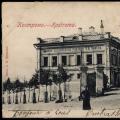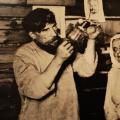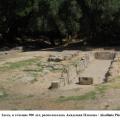Ramon Mercader, who liquidated Trotsky, was awarded the star of the Hero of the Soviet Union in the Kremlin personally by the head of the KGB, Alexander Shelepin.
***
Ramon Mercader (full name Jaime Ramon Mercader del Rio Hernandez) was born in Barcelona into a wealthy Spanish family. He was recruited by the NKVD of the USSR with the help of his mother Maria Caridad, who was an agent of Soviet intelligence. Under the leadership of one of the leaders of Soviet intelligence, N.I. Eitingon, he prepared an assassination attempt on Leon Trotsky, who was expelled from the USSR in 1929, and deprived of Soviet citizenship in 1932, who initiated the creation of the “Fourth International” in 1938 and was considered the leadership of the CPSU (b) the worst enemy of the USSR and Soviet power.
In September 1939, Ramon Mercader became close to Sylvia Ageloff, who was part of Trotsky's entourage. With her help, I met Trotsky, who liked him.
On August 20, 1940, Mercader arrived at Trotsky’s Mexican villa under the pretext of showing him his article, and when he began to read it, he inflicted a wound on Trotsky’s head with an ice pick, from which he died the next day. After his arrest, Mercader, explaining his act as an act of retaliation against a lone fighter, refused to testify.
A Mexican court sentenced him to 20 years in prison. Ramon Mercader served his entire sentence, was released on May 6, 1960 and taken to Cuba, and then secretly transported by ship to the USSR.
After some time, he received documents in Moscow in the name of Ramon Ivanovich Lopez. The Soviet intelligence operation, codenamed "Duck", was finally completed. And the then chairman of the KGB of the USSR, Alexander Shelepin, introduced N.S. Khrushchev petitioned to award Comrade Lopez the title of Hero of the Soviet Union. Particularly emphasized was the fact that for all 20 years Ramon Ivanovich “kept secret his connection with the state security agencies of the Soviet Union.” The secret decree conferring a high rank on Lopez was signed by the then Chairman of the Presidium of the Supreme Council L.I. Brezhnev on May 31, 1960. By a special decision of the CPSU Central Committee, Ramon Ivanovich Lopez was enrolled in the Institute of Marxism-Leninism under the CPSU Central Committee as a senior researcher. He received a state dacha, a spacious apartment in Moscow, and then a substantial pension. A few years later, in the early 70s, he was allowed to travel to Cuba with his family. There he advised Cuban comrades at the request of Fidel Castro. It was there, in Cuba, that Ramon Mercader died in October 1978. According to the last will of the deceased, his ashes were transported to Moscow. Here, at the Kuntsevo cemetery, his grave is located. On the granite monument is his photograph with the Hero’s star and the inscription: “Lopez Ramon Ivanovich. 1913-1978". And just below is his real name: “Ramon Merkader del Rio”.
The German student movement in the 1960s was a multi-layered political movement engaged in radical criticism and struggle against the German regime in the 1950s and 60s. It was part of the international student movement,... ... Wikipedia
1956 1957 1958 1959 1960 1961 1962 1963 1964 See also: Other events in 1960 History of railway transport in 1960 History of public transport in 1960 This article lists the main events in the history of subways ... Wikipedia
1956 1957 1958 1959 1960 1961 1962 1963 1964 See also: Other events in 1960 Other events in the history of the metro Other events in railway transport This article lists the main events in the history of public ... Wikipedia
XX century: 1960 1969 1940s 1950s 1960s 1970s 1980s 1960 1961 1962 1963 1964 1965 1966 1967 1968 ... Wikipedia
1958 – 1959 1960 1961 – 1962 See also: Other Events in 1960 There were various scientific and technological events in 1960, some of which are presented below. Contents 1 Events ... Wikipedia
1958 1959 1960 1961 1962 Portal: Theater See also: Other events in 1960 Events in music and Events in cinema Contents ... Wikipedia
Years in the literature of the 20th century. 1960 in literature. 1896 1897 1898 1899 1900 ← XIX century 1901 1902 1903 1904 1905 1906 1907 1908 1909 1910 1911 1912 1913 1914 1915 1916 1917 ... Wikipedia
Years 1956 · 1957 · 1958 · 1959 1960 1961 · 1962 · 1963 · 1964 Decades 1940s · 1950s 1960s 1970s · 1980s ... Wikipedia
1958 1959 1960 1961 1962 See also: Other events in 1960 ... Wikipedia
1958 1959 1960 1961 1962 Portal:Railway transport See also: Other events in 1960 History of the metro in 1960 ... Wikipedia
Books
- , Azov Andrey. The book examines events from the history of early Soviet translation studies. Discusses how, from the 1920s to the 1950s and 1960s, theoretical and critical works on translation...
- Defeated literalists. From the history of literary translation in the USSR in the 1920-1960s, A. G. Azov. The book examines events from the history of early Soviet translation studies. Discusses how, from the 1920s to the 1950s and 1960s, theoretical and critical works on translation...
On December 30, 1922, at the First All-Union Congress of Soviets, the heads of delegations signed the Treaty on the Formation of the USSR. Initially, the USSR included only 4 union republics: the RSFSR, the Ukrainian SSR, the Belarusian SSR, the Transcaucasian SFSR, and at the time of the collapse of the Union in 1991 there were 15 union republics. Today, to many, the truth of the achievements of this country seems controversial, given the price for these achievements I had to pay, but it is impossible to deny the fact that the era of the USSR became a time of global changes in all sectors of the country’s life. Today, the achievements of a great country and what its citizens preferred not to talk about.
1920 – 1930s: electrification of the entire country and great construction projects
The main achievement of the Land of Soviets in the 1920s was the electrification of the country, the fight against homelessness and the elimination of illiteracy. Medical care and education became free for all Soviet citizens. A children's health camp "Artek" has opened in Crimea.
The 1930s went down in history as a time of great construction projects: the White Sea-Baltic Canal was built in record time, and units at the Dnieper Hydroelectric Power Station were put into operation. The country set a course for industrialization. The developments of domestic scientists related to agriculture - the fight against drought, mechanization, chemicalization and increasing productivity - have gained momentum. A new direction of science is beginning to develop - nuclear physics.

It was during these years that the first Soviet films “Battleship Potemkin” by Sergei Eisenstein, “Circus” and “Jolly Fellows” by Grigory Alexandrov were shot, Sholokhov wrote his novel “Quiet Don”, for which he later received the Nobel Prize in Literature.
1920s – 1930s: time of repression

The Bolsheviks began repressions against political opponents immediately after the October Revolution. But they continued into the 30s. At that time, the fight against “sabotage,” sabotage, political crimes, most of the cases of which were falsified, and the fight against fists was widespread. In the period from August 1937 to November 1938 alone, 390 thousand people were executed and 380 thousand were sent to the Gulags. This time also went down in history as a time of repression against ethnic minorities, in particular Germans, Latvians, Poles, Romanians and Bulgarians.
The symbol of a happy childhood in the USSR is a smiling girl in the arms of Joseph Stalin. This is 6-year-old Gelya Markizova, who came to the Kremlin with her father, one of the leaders of the delegation from Buryat-Mongolia.

True, then no one could have imagined that within a year the girl would have to change her last name, and propaganda would give her face to the most famous pioneer of the country, Mamlakat Nakhangova. And all because Geli’s father was called a spy for Japanese intelligence and shot, and she naturally became the daughter of an enemy of the people.
1940 – 1950s: victory over fascism and debunking the cult of personality
The 1940s were marked by a terrible war, victory over fascism and the beginning of the restoration of the country. At this time, the best works of the Stalinist Empire style were built in Moscow: a complex of high-rise buildings in different areas of the capital, called “7 Sisters” and new metro stations. It was at this time that the Cold War and the arms race between the West and the USSR began. This prompted the creation of the best examples of Soviet military equipment.
On March 8, 1950, the USSR officially announced the possession of the atomic bomb, ending the American monopoly on the world's most destructive weapon. In 1953, the USSR reported the successful testing of a hydrogen bomb. In the period from 1954 to 1960, the virgin lands of Kazakhstan, the Urals, the Volga region, Siberia and the Far East were developed. In 1957, the nuclear-powered icebreaker Lenin was launched. It was at this time that for the first time since 1908, Soviet scientists received several Nobel Prizes.

In 1956, Nikita Khrushchev spoke at the 20th Congress of the CPSU with a report “On the cult of personality and its consequences,” in which he debunked the cult of personality of the late “father of nations.” In 1961, Stalin's body was taken out of the Mausoleum. Mass renaming began: Stalingrad became Volgograd, the capital of the Tajik SSR Stalinabad was renamed Dushanbe. Monuments to Stalin were dismantled everywhere, and many feature films were censored in order to get rid of the “obsessive image.”

During these years, the glory of Russian ballet resounded throughout the planet, and Bolshoi Theater tours became one of the most significant events in cultural life.

In 1958, the film “The Cranes Are Flying” by Mikhail Kalatozov received the Palme d'Or at the Cannes Film Festival. And in the same year, Boris Pasternak was awarded for his novel Doctor Zhivago. True, the poet was forced to refuse the prize, and the novel was never published in the USSR.
1950s: a time of keeping silent about failures
They preferred not to tell Soviet citizens about the failures. So back in 1957, long before the Chernobyl accident, a larger-scale disaster occurred related to the proliferation of nuclear substances. The accident in Kyshtymsk left 11 thousand people without homes, and about 270 thousand people were exposed to radioactivity. The tragedy was first mentioned only in 1960, and its consequences became known only in the early 2000s.1960 – 1970s: leadership in space and hockey
The 1960s for the USSR became a time of leadership in the world of space technology, which began with the flight into space of the first man - Yuri Gagarin. Even spiteful critics of the USSR called this event “a genuine achievement of the Soviet era.”
The 1960s were also the years of world recognition of the culture of the country of the Soviets. Mikhail Sholokhov receives the Nobel Prize in Literature. Violinist David Oistrakh not only attracts concert halls around the world, but also becomes a member of the American Academy of Arts and Sciences in Boston, an honorary member of the National Academy of Santa Cecilia in Rome, a corresponding member of the Academy of Arts in Berlin, the Beethoven Society, the Swedish Academy of Music in Stockholm, an honorary doctor of music from the University of Cambridge and a holder of orders from a number of European countries. The names of Irina Arkhipova, Elena Obraztsova, Galina Vishnevskaya, Maya Plisetskaya, Tamara Sinyavskaya, Rudolf Nureyev, Natalia Makarova and Mikhail Baryshnikov are thundering on the world opera stage. Andrei Tarkovsky's film Ivan's Childhood receives the Golden Lion at the Venice Film Festival.
In the period from 1970 to 1973, the world's first soft landings on Venus of the Soviet space stations Venera-7, Venera-8, Venera-9 and Venera-10 took place. The main Komsomol construction project in the country begins - the construction of the Baikal-Amur Mainline (BAM). The 1970s also became a triumph for Soviet hockey.

In 1977, the right of USSR citizens to free education at all levels (from primary to higher) was enshrined in Article 45 of the Constitution.
1960 - 1970s: environmental disasters and the era of stagnation

Someone considers the Brezhnev era a “golden age”, attributing to this time the factories built, growth statistics, factories built, brilliant films and other unsurpassed achievements. Denouncers of “stagnation” note failures in supplying the population, shortages of goods, low quality products and the destructive environmental consequences of economic activity.
In particular, in the 1960s, due to irrigation, the Aral Sea, which at that time was the fourth largest lake in the world, began to dry up. From 1960 to 2007, its surface area of this reservoir decreased from 68.90 thousand km. sq. up to 14.1 thousand km. sq.

Citizens of the USSR remembered the year 1977 for a series of terrorist attacks in Moscow. There were three explosions: in a Moscow metro car between the Izmailovskaya and Pervomaiskaya stations, in the sales area of a grocery store on Bolshaya Lubyanka and near a grocery store on Nikolskaya. As a result, 7 people were killed and 37 were injured. The main organizer and leader of the terrorist attacks was recognized as Stepan Zatikyan, an Armenian nationalist who longed to “punish the Russians for the oppression of the Armenian people.” Soviet dissidents, and in particular A.D. Sakharov, spoke out against the death sentence imposed on him.
The period of the 1980s began with the Moscow Olympics. In 1981, the film “Moscow Doesn’t Believe in Tears” by Vladimir Menshov received an Oscar. It is known that later Ronald Reagan, preparing for a meeting with Mikhail Gorbachev, watched this film 8 times, trying to “understand the mysterious Russian soul.”
In the late 1980s, Mikhail Gorbachev entered the political arena. The spirit of freedom, perestroika and glasnost begins to soar in the country. Few could have imagined that the country had reached the finish line of its existence. On November 15, 1988, the Soviet spaceplane ship of the reusable transport space system "Buran" made its first and only flight, perhaps ending the era of achievements of the USSR.
And many important events have happened in the world. Here are some of them.
The world's population was 3 billion people.
In 1960, 17 African countries gained independence. Therefore, 1960 was called the “Year of Africa”.
Patrice Lumumba, the head of the government of the Belgian Congo, accused Belgium of aggression, broke off diplomatic relations with it and ordered the army to attack Belgian troops.
In 1960, China experienced bad weather for the second year in a row, which led to extremely low harvests and famine in several provinces. There was also major flooding due to the flooding of the Yangtze River, which killed two million people.
At a meeting at the CPC Central Committee, Liu Shaoqi, Zhou Enlai and other party leaders proposed measures to overcome the consequences of the “Great Leap Forward,” which had brought the Chinese economy to the brink of disaster.
Relations with the USSR began to deteriorate.
The CPSU Central Committee invited Mao Zedong to visit the USSR “for relaxation” in a letter. The invitation was not accepted.
A two-day meeting of communist parties opened in Bucharest.
The Chinese Communist Party has declared its special position.
The central publication of the Communist Party of China, the People's Daily, published an editorial openly criticizing the CPSU. A second critical article was then published.
The General National Assembly of the People of Cuba declared its intention to establish diplomatic relations with all socialist countries.
In the presidential elections in South Korea, President Syngman Rhee was re-elected to a fourth term. On the same day, the Democratic Party of Korea accused the authorities of election fraud. Unrest began in the country. In April, Lee-Seung Man resigned. A month later he emigrated to the USA.
In Portugal, where dictator Salazar ruled, communist prisoners led by the future leader of the Portuguese Communist Party, Alvaro Cunhal, escaped from Caxias prison.
In Turkey, the military that came to power announced an unprecedented purge of the army command. 235 generals and admirals were dismissed from the army, leaving only 20 generals and 1 admiral in service.
Turkish military authorities arrested about 400 deputies of the Majlis, members of the Democratic Party removed from power.
The groundbreaking ceremony for the Aswan High Dam took place in Egypt. A second agreement on Soviet assistance in completing the construction of the Aswan Dam in Egypt was signed in Moscow.
In Baghdad (Iraq), a trial was held of those involved in the assassination attempt on President Abdel Kerim Qassem. 17 people were sentenced to death (among them Saddam Hussein in absentia).
The official inauguration of the new capital, the city of Brasilia, took place in Brazil. On this day, all three branches of government of the republic simultaneously stopped working in the former capital of Rio de Janeiro.
In Buenos Aires (Argentina), members of the Israeli intelligence service Mossad tracked down and kidnapped Nazi criminal Adolf Eichmann.
The United States launched a weather tracking satellite into orbit.
The first nuclear-powered aircraft carrier, the Enterprise, was launched in the United States.
May 1 - an American U-2 reconnaissance aircraft was shot down near Sverdlovsk, the pilot, Francis Powers, was captured. Eisenhower refused to apologize for the incident, which continued the arms race.
In August, the Military Collegium of the Supreme Court of the USSR sentenced Francis Gary Powers to 10 years in prison, with the first three years of the sentence to be served in prison.
On July 4, Independence Day, the flag in the United States changed: it was 48 stars, but became 50 stars, since the territories of Alaska and Hawaii received state status.
In the USSR, the Ministry of Internal Affairs of the USSR was abolished, its functions were transferred to the Ministry of Internal Affairs of the union republics.
The Law “On a new significant reduction in the Armed Forces of the USSR” (by 1,200,000 people) was adopted.
The USSR conducted the first maximum range test of the R-7A intercontinental ballistic missile. Subsequently, the missile was put into service.
The Peoples' Friendship University was established in the USSR. He was subsequently given the name Patrice Lumumba.
In Leningrad, a memorial was opened at the Piskarevskoye cemetery.
In the USSR, the publication of the weekly “Abroad” with a review of the foreign press has been resumed. I immediately began to write him out.
The Moscow Ring Road (MKAD) became the border of Moscow. Five cities were included in the territory of the capital - Tushino, Lyublino, Kuntsevo, Perovo and Babushkin.
In August, the first ever flight of living beings into orbit took place: in the USSR, the Sputnik-5 spacecraft was launched into orbit with the dogs Belka and Strelka on board. The next day the ship returned safely to Earth. This was the first successful flight of living creatures.
At the XVII Summer Olympic Games in Rome, a sensational victory in the marathon was won by the unknown Ethiopian runner Abebe Bikila, who ran barefoot.
August 16 – Joseph Kittinger (USA) set a world record in skydiving. He jumped from a height of 32 kilometers.
The Central Museum of Ancient Russian Culture and Art named after Andrei Rublev opened in Moscow.
In May, a series of earthquakes occurred in Chile. The strongest shock had a magnitude of 9.5 - the maximum for the entire period of regular seismic observations.
Speaking at the session of the UN General Assembly, N.S. Khrushchev tapped the podium with his shoe.
October 12 - the last locomotive-powered commuter train on the Moscow Railway departed from the Kazan station platform.
October 24 – A disaster occurred at the Baikonur Cosmodrome. 92 people died. It was mentioned for the first time in 1989.
The Virgin Lands were formed in the Kazakh SSR.
The first batch of Kadr video recorders for professional use was released in the USSR.
In November, John Kennedy won the US presidential election.
The General Conference on Weights and Measures adopted the International System of Units (SI).
Under the leadership of J. Künzler, the superconducting material niobium-tin was discovered.
American physicist Theodore Maiman demonstrated the operation of the first optical quantum generator - a laser, in which ruby served as the active medium.
The first quasar was discovered by Alan Sandage and Thomas Matthews.
Pound and Rebki performed an experiment that confirmed the existence of gravitational redshift of photons, which is considered as a manifestation of gravitational time dilation, an effect of general relativity.
Jacques Piccard and Don Walsh dived into the Mariana Trench in the bathyscaphe Trieste, setting an absolute dive depth record of 10,916 m.
To be continued.




